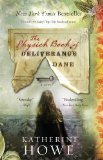Summary | Excerpt | Reviews | Readalikes | Genres & Themes | Author Bio

Connie's advisor, Professor Manning Chilton, looked at her across the table, a small smile flickering at the edge of his mouth. His face, framed with a fringe of brushed cotton hair, was seamed at the forehead, creased by folds from the corners of his nose to his jaw, which the low sunlight in the conference room cast in deep shadow. He carried himself with the easy assurance of the vanishing breed of academic who has spent his entire career under Harvard's crimson umbrella, and whose specialization in the history of science in the colonial period was fueled by a childhood spent shooed away from the drawing room of a stately Back Bay townhouse. He bore the distinguished smell of old leather and pipe tobacco, masculine but not yet grandfatherly.
Chilton was flanked around the conference table by three other respected American historians. To his left perched Professor Larry Smith, a tight-lipped, tweedy junior faculty economist, who asked knotty questions designed to indicate to the senior professors his authority and expertise. Connie glowered at him; twice already in the exam he had asked questions probing where he knew her knowledge was scanty. She supposed that that was his job, but he was the only committee member likely to recall his own qualifying exams. Perhaps she had been naïve to expect solidarity from him; oftentimes professors of his rank were the hardest on grad students, as if to make up for the indignities they felt themselves to have suffered. He smiled back at her primly.
To Chilton's right, her chin on one jeweled hand, sat Professor Janine Silva, a blowsy, recently-tenured gender studies specialist who favored topics in feminist theory. Her hair was wilder and wavier today than usual, with a burgundy sheen that was patently false. Connie enjoyed Janine's willful denial of the Harvard aesthetic; long floral scarves were her trademark. One of Janine's favorite rants concerned Harvard's relative hostility to women academics; her interest in Connie's career sometimes bordered on the motherly, and as a result Connie consciously had to work to control the pseudo-parental transference that many students develop towards their mentors. While Chilton held more power over her career, Connie dreaded disappointing Janine the most. As if sensing this momentary flicker of anxiety, Janine sent Connie a thumbs-up, partly concealed behind one of her arms.
Finally, to Janine's right hunched Professor Harold Beaumont, Civil War historian and staunch conservative, known for his occasional grumpy forays onto the editorial page of the New York Times. Connie had never worked closely with him, and had only placed him on her committee because she suspected that he would have very little personally invested in her performance. Between Janine and Chilton she thought she had enough expectations to manage. As these thoughts traveled through her mind, she felt Beaumont's dark eyes burning a tight round hole in the shoulder of her sweater.
Connie gazed down at the surface of the table and traced the outline of the initials that had been carved there, darkened by decades of waxy polish. She roamed through the file cabinets in her brain, looking for the answer that they wanted. Where was it? She knew it was there somewhere. Was it under "W," for "Witchcraft?" No. Or was it listed under "G," for "Gender Issues?" She opened each mental drawer in turn, pulling out index cards by the handful, shuffling through them, and then tossing them aside. The bubble of nausea rose again in her throat. The card was gone. She could not find it. Those whispered stories about students failing, they were going to be about her. She had been given the simplest question possible, and she could not produce an answer.
She was going to fail.
A haze of panic began to cloud her vision, and Connie fought to keep her breath steady. The facts were there, she must just focus enough to see them. Facts would never abandon her. She repeated the word to herself - facts. But wait - she had not looked under "F," for "Folk Religion, Colonial Era." She pulled the mental drawer open, and there it was! The haze cleared. Connie straightened herself against the hard chair, and smiled.
From The Physick Book of Deliverance Dane by Katherine Howe. Copyright 2009 Katherine Howe. To be published in June 2009. Available wherever books are sold. All rights reserved.




A library is a temple unabridged with priceless treasure...
Click Here to find out who said this, as well as discovering other famous literary quotes!
Your guide toexceptional books
BookBrowse seeks out and recommends the best in contemporary fiction and nonfiction—books that not only engage and entertain but also deepen our understanding of ourselves and the world around us.